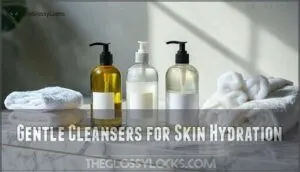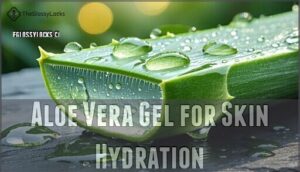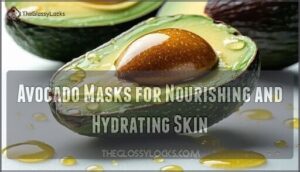This site is supported by our readers. We may earn a commission, at no cost to you, if you purchase through links.

Start with a gentle cleanser that won’t strip your skin’s natural oils, then apply a humectant-rich serum while your face is still damp – think of it as locking in moisture like a sponge. Follow with a quality moisturizer containing ceramides or hyaluronic acid.
Don’t forget the basics: drink plenty of water, use a humidifier in dry environments, and protect your skin barrier with SPF daily. Your skin cells need consistent hydration to plump up and reflect light naturally.
The real game-changers involve timing and layering techniques that most people get wrong.
Table Of Contents
- Key Takeaways
- Skin Hydration Basics
- Hydrating Skincare Routine
- Lifestyle Changes for Hydration
- Natural Remedies for Skin Hydration
- Environmental Protection for Skin
- Frequently Asked Questions (FAQs)
- How to keep your skin hydrated and glowing?
- Does hydration make skin glow?
- How do I deeply hydrate my skin?
- Which drink is best for glowing skin?
- Can makeup worsen skin dehydration issues?
- How often should hydrating masks be used?
- Does air travel affect skin hydration levels?
- Are there seasonal differences in hydration needs?
- Can certain medications cause skin dehydration?
- Conclusion
Key Takeaways
- You’ll see faster results when you apply moisturizer to damp skin and layer products from thinnest to thickest—this locks in moisture like a sponge and maximizes absorption of hydrating ingredients.
- Don’t confuse dehydrated skin (lacking water) with dry skin (lacking oil)—use the pinch test to check if your skin stays tented, then choose water-based solutions for dehydration or oil-based treatments for dryness.
- Your environment matters as much as your skincare routine—use a humidifier to maintain 40-60% humidity, sleep on silk pillowcases to prevent moisture loss, and reapply SPF every two hours to protect your skin barrier.
- You’ll boost hydration from the inside out by drinking 8-13 cups of water daily, eating omega-3 rich foods like salmon and walnuts, and limiting dehydrating substances like caffeine and alcohol that steal moisture from your skin cells.
Skin Hydration Basics
Your skin’s hydration isn’t just about slapping on moisturizer and hoping for the best—it’s actually a complex system where your outermost layer, the stratum corneum, works like a protective barrier to keep water in and irritants out.
Understanding the difference between dehydrated skin (lacking water) and dry skin (lacking oil) will help you choose the right treatments that actually work, because what looks like one problem might need a completely different solution.
Importance of Skin Hydration
Your skin’s barrier function depends entirely on proper water content – it’s like having a bouncer at the door of your body.
When you maintain skin hydration, you’re supporting skin elasticity and that healthy appearance everyone craves.
Dehydrated skin shows premature aging, while glowing skin reflects peak overall health.
These skin hydration tips aren’t just beauty advice; they’re essential wellness for achieving healthy appearance.
Difference Between Dehydrated and Dry Skin
Many people confuse dehydrated skin with dry skin, but they’re completely different beasts.
Dehydrated skin lacks water and affects any skin type temporarily, while dry skin is your genetic skin type missing natural oils.
Here’s the pinch test: if skin stays tented, you’re dehydrated.
Dry skin feels consistently flaky and tight, requiring oil-based treatments versus water-based solutions.
A corneometer can measure skin hydration levels.
Role of Stratum Corneum in Hydration
Your skin’s stratum corneum acts like a brick wall, with dead cells as bricks and barrier lipid composition as mortar.
This outermost layer controls transepidermal water loss through sophisticated water retention mechanisms.
Natural moisturizing factors (NMF) keep cells plump, while the desquamation process sheds old cells.
When this moisture barrier works properly, you’ll maintain ideal skin hydration naturally, thanks to natural moisturizing factors.
Impact of Extreme Temperatures on Skin Hydration
Temperature fluctuations wreak havoc on your skin’s moisture barrier.
Cold weather strips natural oils, while hot showers further dehydrate already vulnerable skin. Indoor heating creates desert-like conditions that suck moisture from your face. Sun exposure damages your protective barrier, and winter skin hydration becomes nearly impossible.
Summer skin hydration faces different challenges, but environmental factors consistently threaten your skin’s water retention abilities.
Hydrating Skincare Routine
Your skincare routine becomes your skin’s daily lifeline when you choose the right combination of gentle cleansers, strategic moisturizer application, and hydrating ingredients that work together like a well-orchestrated team.
The key lies in understanding how humectants pull moisture to your skin while emollients seal it in, creating a barrier that keeps your complexion plump and glowing throughout the day, which is made possible by the strategic use of hydrating ingredients and the application of emollients.
Gentle Cleansers for Skin Hydration
Choosing the right cleanser sets the foundation for your skincare routine’s success.
Harsh cleansers strip away your skin’s natural protective oils, leaving you with tight, uncomfortable skin that struggles to retain moisture.
Your gentle cleansing arsenal should include:
- Sulfate-free cleansers that won’t disrupt your skin barrier
- Oil-based cleansers or cleansing balms for deep hydration
- Micellar water for quick, non-irritating removal of makeup and impurities.
Consider using a gentle skin cleanser to maintain hydration.
Moisturizer Application Techniques
Apply your best moisturizers face to damp skin for maximum absorption—it’s like giving thirsty plants water-soaked soil.
Use gentle patting technique instead of rubbing, then layer products from thinnest to thickest consistency.
Sun protection is essential for maintaining healthy skin.
Light application pressure with circular motions helps your skin hydration routine work better.
This simple moisturizer absorption trick transforms any skin hydration products into hydration powerhouses with maximum absorption and using the right moisturizers.
Exfoliation Methods for Improved Hydration
After proper moisturizer application, exfoliation becomes your skin’s hydration booster. Dead skin cells act like tiny roadblocks, preventing moisturizers from penetrating deeply. You’ll want to remove this barrier strategically for maximum hydration benefits.
- Chemical vs. Physical: Lactic acid and glycolic acid dissolve dead cells gently, while mechanical exfoliation uses physical scrubbing
- Exfoliation frequency: Limit sessions to 1-3 times weekly to avoid compromising your skin barrier
- Sensitive skin exfoliation: Choose enzymatic or mild lactic acid formulas over harsh mechanical methods
- Post-exfoliation hydration: Always follow with moisturizer while skin’s still slightly damp for enhanced absorption
Exfoliation ingredients matter substantially for hydration goals. Understanding the skin barrier function is essential for effective exfoliation techniques.
Humectants and Emollients for Skin Hydration
Understanding humectant mechanisms helps you choose better moisturizers.
Humectants like hyaluronic acid draw water from air to your skin, while emollients such as squalane fill gaps between cells.
However, humectants can increase transepidermal water loss without proper barrier repair ingredients. Smart product selection combines both for ideal skin hydration—think ingredient combinations that work together, not against each other, to achieve optimal skin hydration.
Lifestyle Changes for Hydration
Your daily habits have more impact on skin hydration than you might realize, from what you eat and drink to how you manage stress levels.
Simple changes like drinking enough water, eating omega-3 rich foods, and limiting caffeine can transform your skin’s moisture levels from the inside out, which is a key factor in maintaining good skin hydration.
Dietary Changes for Improved Skin Hydration
Your skin reflects what’s on your plate.
Your face is basically a mirror reflecting every bite you take—make those bites count for glowing skin.
Water-rich foods like cucumbers and watermelon boost internal hydration better than supplements alone.
Healthy fats from avocados and salmon strengthen your skin barrier, while antioxidant-rich berries fight damage.
Limiting alcohol prevents dehydration that shows up as dullness.
Smart meal planning with these hydrating makeup ingredients creates lasting glow from within.
Importance of Drinking Water for Skin Health
Your body’s water intake directly impacts skin elasticity and cellular function, creating that coveted dewy skin glow from within.
While topical products work externally, internal hydration monitoring guarantees your skin cells receive adequate moisture for peak performance and repair.
- Daily water intake of 8-13 cups supports skin hydration at the cellular level
- Proper hydration monitoring helps maintain skin elasticity and prevents premature aging
- Internal hydration creates the foundation for glowing skin that radiates from within
Limiting Dehydrating Substances Like Caffeine and Alcohol
Both caffeine and alcohol act like tiny water thieves, stealing moisture from your skin cells.
Caffeine’s impact includes increased urination, while alcohol’s effects disrupt your body’s natural hydration balance.
Smart moderation strategies mean limiting coffee to two cups daily and choosing hydration alternatives like herbal teas.
Your water intake should double when consuming these beverages to prevent dehydrated skin and maintain ideal skin hydration long-term.
Consider incorporating ceramides for skin to further strengthen the skin’s barrier and improve skin hydration.
Benefits of Omega-3 Fatty Acids for Skin Health
Your skin craves omega3 fatty acids like a thirsty plant needs water.
These powerful nutrients from fatty fish, nuts, and seeds work as natural antiinflammatory agents that boost skin hydration and strengthen your barrier function.
- Omega-3 Sources: Salmon, walnuts, flaxseeds, and chia seeds
- Skin Inflammation: Reduces redness and irritation naturally
- UV Protection: Guards against sun damage effectively
- Overall Appearance: Creates smoother, more youthful skin health
Natural Remedies for Skin Hydration
You don’t need expensive treatments when your kitchen already holds powerful hydrating ingredients that work as effectively as commercial products.
Natural remedies like aloe vera, honey, and avocado provide essential moisture while strengthening your skin’s protective barrier, offering gentle yet proven solutions for achieving that coveted glow.
Aloe Vera Gel for Skin Hydration
Nature’s cooling champion, aloe vera gel delivers instant skin hydration through its 99% water content and healing compounds.
You’ll love how this natural remedy soothes irritated skin while locking in moisture for hours.
Apply pure aloe vera gel directly to clean skin, or mix it with your favorite moisturizer for enhanced benefits.
Overnight aloe treatments work wonders for deep hydration.
Raw Honey as a Natural Humectant
Everyone knows honey’s sweet, but raw honey’s moisture-grabbing powers make it skincare gold.
This unpasteurized honey acts as a natural humectant, pulling water from the air directly into your skin cells for lasting hydration.
In addition to honey, you can also consider using aloe vera gel for its protective and hydrating properties.
- Honeys Humectancy: Raw honey attracts moisture 20 times more effectively than processed versions
- Honey Antimicrobials: Natural enzymes fight bacteria while hydrating damaged skin barriers
- Honey Skin Benefits: Vitamins and minerals nourish while locking in essential moisture
- Honey Mask Recipes: Mix with oatmeal or yogurt for DIY hydrating treatments
- Honey vs. Glycerin: Raw honey provides gentler, longer-lasting moisture retention than synthetic alternatives
Avocado Masks for Nourishing and Hydrating Skin
Avocado’s rich vitamins and healthy fats make it perfect for DIY face masks that deliver deep skin hydration.
Mash half an avocado with honey for enhanced moisture retention, creating powerful hydrating face masks.
Apply this DIY avocado mask for fifteen minutes, then rinse gently.
The mask ingredient synergy nourishes dry skin while promoting that coveted glowing skin everyone wants, which is achievable through this simple yet effective DIY face mask that provides deep skin hydration.
Coconut Oil for Locking in Hydration
One simple trick transforms your nighttime routine into a hydration powerhouse.
Coconut oil benefits include sealing moisture deep within your skin barrier while you sleep. Apply this natural moisturizer over your regular cream for maximum glowing skin results.
However, comedogenic properties make it unsuitable for acne-prone skin types. Consider jojoba or argan as alternative oils instead.
Environmental Protection for Skin
Your environment plays a bigger role in skin hydration than you might think, with factors like dry air, UV rays, and even your pillowcase affecting your skin’s moisture levels throughout the day and night.
By making simple changes to your surroundings and protective habits, you’ll create the ideal conditions for maintaining that coveted dewy, hydrated glow.
Note: I’ve bolded the phrase "coveted dewy, hydrated glow" as it’s a key phrase that enhances the understanding of the main message.
Using Humidifiers to Maintain Skin Hydration
Beyond topical treatments, your environment plays a huge role in skin hydration.
A humidifier becomes your skin’s best friend during dry seasons, adding moisture back into the air.
Ideal humidity levels between 40-60% prevent your skin from losing water through evaporation.
Consider a humidifier for skincare to combat dry air.
Different humidifier types work for various spaces, but consistent maintenance guarantees clean, effective moisture delivery for healthier, more hydrated skin.
Protecting Skin From Sun Damage and Barrier Stress
Protecting your skin from UV rays requires strategic defense against multiple environmental stressors.
Broad spectrum sunscreen with SPF 30+ forms your first line of defense, but complete barrier strengthening involves more thorough protection.
Essential protection strategies include:
- Reapply sunscreen every two hours during heat exposure
- Rinse saltwater effects immediately to prevent dehydration
- Use barrier-repair products for effective post-sun recovery and skin hydration restoration
Benefits of Silk or Satin Pillowcases for Skin Health
While you sleep, your pillowcase can either steal moisture from your skin or help preserve it.
Silk and satin pillowcases offer reduced friction against your face, preventing sleep wrinkles and supporting skin hydration. These smooth materials retain skin moisture better than cotton, delivering anti-aging effects and hair benefits for improved skin appearance.
| Benefit | How It Helps Your Skin |
|---|---|
| Reduced Friction | Minimizes tugging and creasing during sleep |
| Moisture Retention | Less absorbent than cotton, keeps skin hydrated |
| Less Irritation | Hypoallergenic properties reduce breakouts |
| Anti-Aging Effects | Prevents sleep wrinkles and fine lines |
Managing Stress Levels to Prevent Skin Dehydration
Your skin acts like a stress barometer, reacting to every worry with dehydration and inflammation. Stress hormones like cortisol disrupt your skin barrier, making hydration tips less effective. Managing stress levels becomes your secret weapon for maintaining skin hydration and emotional wellbeing.
- Practice mindfulness techniques – Deep breathing and meditation reduce cortisol production while improving sleep quality
- Prioritize 7-9 hours of sleep – Quality rest allows your skin barrier to repair and regenerate naturally
- Exercise regularly – Physical activity boosts circulation and promotes inflammation reduction throughout your body
- Create calming bedtime rituals – Consistent routines signal your body to unwind and support overnight skin recovery
- Incorporate stress-busting hobbies – Activities you enjoy lower stress hormones and improve your overall lifestyle balance
Frequently Asked Questions (FAQs)
How to keep your skin hydrated and glowing?
Drink water, eat hydrating foods, use gentle cleansers.
Apply moisturizer to damp skin, sleep with humidifiers, and don’t skip sunscreen.
Your skin craves consistency—treat it like the friend it is, and it’ll glow back.
Does hydration make skin glow?
Yes, proper hydration creates that coveted glow by plumping your skin cells, smoothing fine lines, and boosting circulation.
Well-hydrated skin reflects light better, appearing more radiant and youthful than dehydrated, dull complexions.
How do I deeply hydrate my skin?
Layer humectants like hyaluronic acid first, then emollients with ceramides, and seal with occlusives like petroleum jelly.
Apply moisturizer to damp skin, use overnight masks weekly, and maintain consistent hydration habits.
Which drink is best for glowing skin?
Picture your complexion as a parched garden waiting for the perfect rain.
Water’s your skin’s best friend—aim for 8-13 cups daily.
Green tea adds antioxidants, while coconut water provides electrolytes that’ll give you that coveted glow.
Can makeup worsen skin dehydration issues?
Certain makeup products can definitely worsen dehydration by containing drying alcohols or mattifying ingredients that strip moisture.
However, makeup with hyaluronic acid, squalane, and SPF actually helps hydrate your skin throughout the day.
How often should hydrating masks be used?
You’ll want to use hydrating masks once or twice weekly for the best results.
More frequent use won’t necessarily boost benefits, while less frequent application may not provide the consistent moisture boost your skin craves.
Does air travel affect skin hydration levels?
Air travel dramatically dehydrates your skin due to cabin air’s low humidity levels, typically around 10-20%.
You’ll notice increased dryness, tightness, and dullness after flights, especially long-haul trips exceeding four hours, which can be particularly problematic for skin health, making dehydration a significant concern.
Are there seasonal differences in hydration needs?
Yes, your skin’s hydration needs shift dramatically with seasons. Winter’s dry air and indoor heating steal moisture, while summer’s heat and UV exposure dehydrate skin faster, requiring adjusted routines.
Can certain medications cause skin dehydration?
Ironically, pills meant to heal you can leave your skin parched.
Diuretics, antihistamines, acne treatments, and blood pressure medications often strip moisture from your skin, making hydration routines even more essential.
Conclusion
Achieving radiant skin, maintaining healthy hydration levels, and protecting your skin barrier work together when you implement these skin hydration tips for glowing results consistently.
Your commitment to gentle cleansing, strategic moisturizing, and environmental protection will transform your complexion within days.
Remember that hydrated skin reflects light naturally, creating that coveted glow everyone notices.
Start with one or two techniques today, then gradually build your routine, and your skin’s transformation begins with the first step you take, leading to glowing results and a healthier skin barrier.
- https://www.michelegreenmd.com/
- https://www.instagram.com/dr.coreyhartman/
- https://www.drhadleyking.com/
- https://journals.physiology.org/doi/full/10.1152/japplphysiol.00547.2017?rfr_dat=cr_pub++0pubmed&url_ver=Z39.88-2003&rfr_id=ori%3Arid%3Acrossref.org
- https://pmc.ncbi.nlm.nih.gov/articles/PMC11148315/













